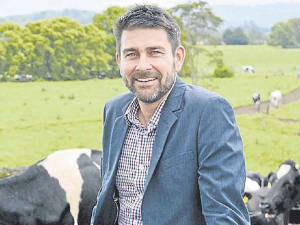Kiwi dairy farmers are being told to expect a significantly lower farmgate milk price in the coming season, as the global milk market absorbs the impact of COVID-19.
However, there’s an expectation that any recovery could be only a year away as commentators believe nothing structural has changed in the global dairy market, meaning it can bounce back relatively quickly.
Rabobank dairy analyst Michael Harvey told Dairy News that farmers need to brace themselves for a volatile 12-months ahead, saying “things are going to get worse before they get better.”
Harvey says the impact of COVID-19 on global dairy prices has been magnified by the seasonal peak coming on from the Northern Hemisphere, leading to demand destruction.
“The build-up in inventories in North America and Europe and a surge in exports from that part of the world will put downward pressure on prices.”
Harvey says this is going to have a knock-on effect on farmgate prices in NZ – and elsewhere in the world – for the year from June 2020 till May 2021.
This has led Rabobank to forecast a farmgate milk price of $5.60/kgMS for the 2020/21 season. Accordingly, the bank is expecting New Zealand dairy companies to announce conservative opening forecasts for the coming season.
“Fundamentally, global dairy prices are going to be weaker. The question is how low will it go before it gets better?”
Harvey says the early signals of lower farmgate prices for the coming season give farmers time to prepare and to plan cautiously.
Farming budgets will be crucial over the season ahead, he says, and farmers will need strong financial discipline to be in a stable position coming out of this cycle.
Harvey says one silver lining is the low NZ dollar, which will help cushion any fall in milk prices.
“Compared with the dairy downturn at the time of the GFC, the NZ dollar is 15 cents lower, which means a farmgate price with $5 in front of it rather than below $5.”
According to Harvey, even before COVID-19 there were signs of global dairy supply picking up.
“US milk production was up 2.2% in March alone.”
He told Dairy News that this modest supply growth, in conjunction with the economic shock of Covid-19, will mean lower farmgate prices.
Harvey added there are already signs of Northern Hemisphere farmgate prices falling. This financial pressure will lead to cows being culled and an eventual drop in global milk supply.
Meanwhile, Harvey says the impact of Covid-19 has also influenced consumer sales of dairy produce around the world.
“There was a short-term lift in retail sales (supermarkets) – especially at the start of lockdown as people stocked up,” he says. “However, we are now seeing retail trading conditions return to normal as supermarket chains report consumers going back typical shopping.”
Inaccurate science
Rabobank dairy analyst Michael Harvey concedes that forecasting milk prices is a tough gig in normal times, but even more difficult when a shock like Covid-19 appears.
“Given the rapidly changing environment due to COVID, forecasting prices is incredibly difficult this far out. There are a number of upside and downside risks that could impact global dairy markets over the course of our forecast timeframe”
Meanwhile, Harvey also points out that the return of China will be crucial to any recovery in dairy prices.
“Dairy will not come out of this cycle unscathed and one of the significant factors over the coming 12 months will be the level of Chinese activity.”
He says a slow recovery appears to be happening in China, as its economy moves to a post COVID footing.


















